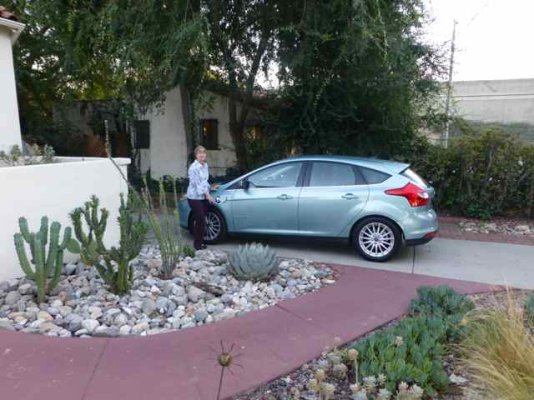IMHO
If someone wants to buy an electric or hybrid car, they are under no obligation to justify it to anyone.
Of course not (well maybe one exception to follow). But once they start talking up the environmental benefits, then it opens that up for discussion, right? I think that's all we're doing here. People can buy what they wish.
The possible exception: If they got a subsidy, then 'we' ended up paying for a part of their car, one more expensive than I would buy for myself. So
maybe that deserves a little justification? And the justification is often, 'I am being green for your benefit'. or 'I am an early adopter, and you will benefit'. And that is debatable.
In fact in the case Tesla, I think the green benefits will be minimal just because they made the car so damn much fun to drive. The Edmunds guys made a rough calculation that jamming the pedal to the metal loses about 1 mile of range per second. So going from 0 to 60 in 5 seconds means 5 miles less range. I doubt there is a Tesla owner out there that doesn't do that pretty often.
Interesting point I had not considered. The Tesla is a high performance car, and people who buy performance vehicles don't drive them like they have a goldfish on the front seat. People who buy high mpg hybrids (the comparison for eco-benefits), do tend to drive conservatively. While it's hard to pin a number on that, it does cut into the already marginal eco-benefit. But using those numbers, 'punching' it just 4 times in a 200 mile drive cycle would cut the benefits by 10% - not an unreasonable guess-timate, and not an insignificant drop in eco-benefit.
It's similar to the people who buy tankless water heaters, which are sold as eco-friendly, then brag about how everyone in the family can take half-hour showers now, and how they can fill their whirlpool bath every week and have plenty of steaming hot water!
Likewise in the Tesla forum,there is a thread devoted solely to owners talking about how instead of taking the 20-30 minute route home from work they take the 1 hour route home. Folks looking for excuse to run errands for the wife, or just taking the car out for a joy ride.
Another good point. Makes sense, who is going to buy an expensive, cool-looking, head-turning, fun-to-drive car, and then leave it in the garage? These comments are really more towards the Roadster. As you move down to lower priced EVs, I do think the subsidy may have some effect on sales volumes as it's a larger % of the price, and the lower priced cars won't have the same 'wow' factor for performance and joy drives (though EVs by nature have lots of low-end torque).
For those without PV, I can safely say those who will always drive their Tesla in a ecologically friendly manner will be near 0.
Thanks for getting back to this. I keep seeing people make the connection between PV panels and an EV and talking about how they now have no impact on the environment as they generate all the electricity for their driving. But it appears to be false logic, as the two can be purchased independently. Check my thought process on this:
For simplicity, let's assume a household consumes one 'unit' of electrical power average per month. And assume if they purchased an EV, that would consume one 'unit' of electrical power average per month. And that they could install PV solar that would produce one 'unit' of electrical power average per month. Now consider each possibility:
1) NO EV; NO PV; - status quo - consume ONE unit electrical, consume X gallons gas
2) NO EV; YES PV; - consume ZERO units electrical, consume X gallons gas
3) YES EV; NO PV; - consume TWO units electrical, consume ZERO gallons gas
4) YES EV; YES PV; - consume ONE unit electrical, consume ZERO gallons gas
See how they are individual events? The EV trades electrical consumption for gas consumption (the benefit, if any, depends on factors including how clean the local grid is). The PV offsets grid consumption. But there is no magic multiplier effect between the two. Each benefit stands on its own. When people try to tie the two, it's ignoring that you could have used the PV to offset grid consumption - you wouldn't just leave the PV disconnected if you didn't own an EV.
For illustration, say a specific EV actually under-performed (in eco-terms) a high-mpg hybrid in a certain scenario. In that case, one would do more eco-good with PV panels and that hybrid than with PV and EV. With the hybrid, they would be consuming
none of that dirty electrical supply.
Just as all consumers,not just Apple customers, benefited from the innovations that Jobs came up with, I think all car buyers will benefit from stuff the Tesla did right.
I am super-impressed with Elon's ability to bring this car to market. To me, his genius was realizing that the batteries required for long range (which are very $$$) also provide incredible performance, and he could make a super-performance, long range, very expensive EV which could compete price-wise with other super-performance, very expensive cars. And then actually doing it.
But I question if the average driver will benefit from his work. The thing, the big RED X, standing between the average driver and an EV is battery cost/performance. Always has been (there were EVs in the 1900's and 1910's). The rest of the work in producing EVs is just basic engineering, most of which is pretty well understood. There are at least a dozen different car companies with that capability. They just need a superior battery. And battery tech is driven by an array of markets, EVs are small potatoes in that market.
-ERD50


